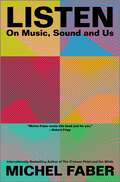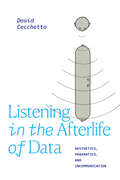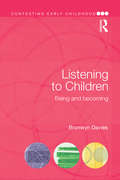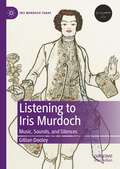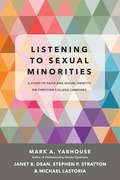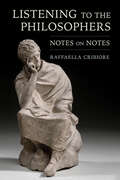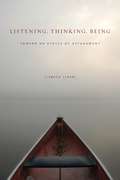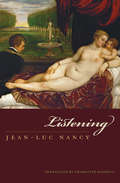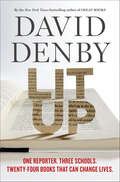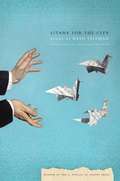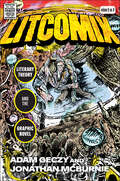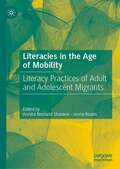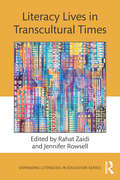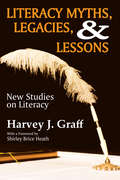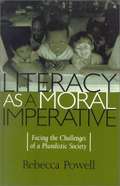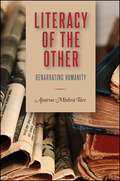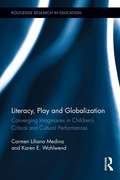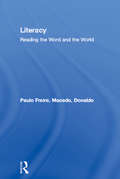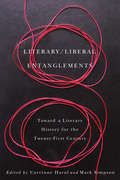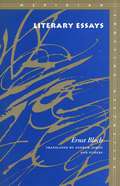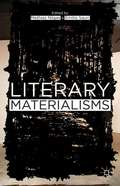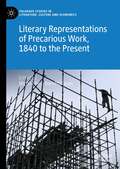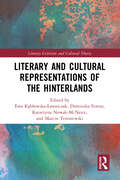- Table View
- List View
Listen: On Music, Sound and Us
by Michel Faber"I'm not here to change your mind about Dusty Springfield or Shostakovich or Tupac Shakur or synthpop. I'm here to change your mind about your mind." There are countless books on music with much analysis given to musicians, bands, eras and/or genres. But rarely does a book delve into what's going on inside us when we listen.Michel Faber explores two big questions: how do we listen to music and why do we listen to music? To answer these questions, he considers a range of factors, which includes age, illness, the notion of "cool," commerce, the dichotomy between "good" and "bad" taste and much more. From the award-winning author of The Crimson Petal and the White and Under the Skin, this idiosyncratic and philosophical book reflects Michel Faber's lifelong obsession with music of all kinds. Listen will change your relationship with the heard world.
Listening in the Afterlife of Data: Aesthetics, Pragmatics, and Incommunication (Thought in the Act)
by David CecchettoIn Listening in the Afterlife of Data, David Cecchetto theorizes sound, communication, and data by analyzing them in the contexts of the practical workings of specific technologies, situations, and artworks. In a time he calls the afterlife of data—the cultural context in which data’s hegemony persists even in the absence of any belief in its validity—Cecchetto shows how data is repositioned as the latest in a long line of concepts that are at once constitutive of communication and suggestive of its limits. Cecchetto points to the failures and excesses of communication by focusing on the power of listening—whether through wearable technology, internet-based artwork, or the ways in which computers process sound—to pragmatically comprehend the representational excesses that data produces. Writing at a cultural moment in which data has never been more ubiquitous or less convincing, Cecchetto elucidates the paradoxes that are constitutive of computation and communication more broadly, demonstrating that data is never quite what it seems.
Listening to Children: Being and becoming (Contesting Early Childhood)
by Bronwyn DaviesThrough a series of exquisite encounters with children, and through a lucid opening up of new aspects of poststructuralist theorizing, Bronwyn Davies opens up new ways of thinking about, and intra-acting with, children. This book carefully guides the reader through a wave of thought that turns the known into the unknown, and then slowly, carefully, makes new forms of thought comprehensible, opening, through all the senses, a deep understanding of our embeddedness in encounters with each other and with the material world. This book takes us into Reggio-Emilia-inspired Swedish preschools in Sweden, into the author’s own community in Australia, into poignant memories of childhood, and offers the reader insights into: new ways of thinking about children and their communities; the act of listening as emergent and alive; ourselves as mobile and multiple subjects; the importance of remaining open to the not-yet-known. Defining research as diffractive, and as experimental, Davies’ relationship to the teachers and pedagogues she worked with is one of co-experimentation. Her relationship with the children is one in which she explores the ways in which her own new thinking and being might emerge, even as old ways of thinking and being assert themselves and interfere with the unfolding of the new. She draws us into her ongoing experimentation, asking that we think hard, all the while delighting our senses with the poetry of her writing, and the stories of her encounters with children.
Listening to Iris Murdoch: Music, Sounds, and Silences (Iris Murdoch Today Ser.)
by Gillian DooleyWhen we think of Iris Murdoch’s relationship with art forms, the visual arts come most readily to mind. However, music and other sounds are equally important. Soundscapes – music and other types of sound – contribute to the richly textured atmosphere and moral tenor of Murdoch’s novels. This book will help readers to appreciate anew the sensuous nature of Iris Murdoch’s prose, and to listen for all kinds of music, sounds and silences in her novels, opening up a new sub-field in Murdoch studies in line with the emerging field of Word and Music Studies. This study is supported by close readings of selected novels exemplifying the subtle variety of ways she deploys music, sounds and silence in her fiction. It also covers Murdoch’s knowledge of music and her allusions to music throughout her work, and includes a survey of musical settings of her words by various composers.
Listening to Sexual Minorities: A Study of Faith and Sexual Identity on Christian College Campuses (Christian Association for Psychological Studies Books)
by Mark A. Yarhouse Janet B. Dean Stephen P. Stratton Michael LastoriaListening to Sexual Minorities
Listening to the Philosophers: Notes on Notes
by Raffaella CribioreListening to the Philosophers offers the first comprehensive look into how philosophy was taught in antiquity through a stimulating study of lectures by ancient philosophers that were recorded by their students. Raffaella Cribiore shows how the study of notes—whether Philodemus of Gadara's notes of Zeno's lectures in the first century BCE, or Arrian recording the Discourses of Epictetus in the second century CE, or the students of Didymus the Blind in the fourth century and Olympiodorus in the sixth century—can enable us to understand the methods and practices of what was an orally conducted education. By considering the pedagogical and mnemonic role of notetaking in ancient education, Listening to the Philosophers demonstrates how in antiquity the written and the spoken worlds were intimately intertwined.
Listening, Thinking, Being: Toward an Ethics of Attunement
by Lisbeth LipariAlthough listening is central to human interaction, its importance is often ignored. In the rush to speak and be heard, it is easy to neglect listening and disregard its significance as a way of being with others and the world. Drawing upon insights from phenomenology, linguistics, philosophy of communication, and ethics, Listening, Thinking, Being is both an invitation and an intervention meant to turn much of what readers know, or think they know, about language, communication, and listening inside out. It is not about how to be a good listener or the numerous pitfalls that stem from the failure to listen. Rather, the purpose of the book is, first, to make readers aware of the value and importance of listening as a fundamental human ability inextricably connected with language and thought; second, to alert readers to the complexity of listening from personal, cultural, and philosophical perspectives; and third, to offer readers a way to think of listening as a mode of communicative action by which humans create and abide in the world. Lisbeth Lipari brings together historical, literary, intercultural, scientific, musical, and philosophical perspectives, as well as a range of her own personal experiences, to produce this highly readable analysis of how “the human experience of being as an ethical relation with others . . . is enacted by means of listening.”
Listening, Thinking, Being: Toward an Ethics of Attunement
by Lisbeth LipariAlthough listening is central to human interaction, its importance is often ignored. In the rush to speak and be heard, it is easy to neglect listening and disregard its significance as a way of being with others and the world. Drawing upon insights from phenomenology, linguistics, philosophy of communication, and ethics, Listening, Thinking, Being is both an invitation and an intervention meant to turn much of what readers know, or think they know, about language, communication, and listening inside out. It is not about how to be a good listener or the numerous pitfalls that stem from the failure to listen. Rather, the purpose of the book is, first, to make readers aware of the value and importance of listening as a fundamental human ability inextricably connected with language and thought; second, to alert readers to the complexity of listening from personal, cultural, and philosophical perspectives; and third, to offer readers a way to think of listening as a mode of communicative action by which humans create and abide in the world. Lisbeth Lipari brings together historical, literary, intercultural, scientific, musical, and philosophical perspectives, as well as a range of her own personal experiences, to produce this highly readable analysis of how “the human experience of being as an ethical relation with others . . . is enacted by means of listening.”
Listening: A History Of Our Ears (Perspectives in Continental Philosophy)
by Charlotte Mandell Jean-Luc NancyIn this lyrical meditation on listening, Jean-Luc Nancy examines sound in relation to the human body. How is listening different from hearing? What does listening entail? How does what is heard differ from what is seen? Can philosophy even address listening, écouter, as opposed to entendre, which means both hearing and understanding? Unlike the visual arts, sound produces effects that persist long after it has stopped. The body, Nancy says, is itself like an echo chamber, responding to music by inner vibrations as well as outer attentiveness. Since “the ear has no eyelid” (Quignard), sound cannot be blocked out or ignored: our whole being is involved in listening, just as it is involved in interpreting what it hears. The mystery of music and of its effects on the listener is subtly examined. Nancy’s skill as a philosopher is to bring the reader companionably along with him as he examines these fresh and vital questions; by the end of the book the reader feels as if listening very carefully to a person talking quietly, close to the ear.
Lit Up: One Reporter. Three Schools. Twenty-four Books That Can Change Lives
by David DenbyA bestselling author and distinguished critic goes back to high school to find out whether books can shape livesIt's no secret that millions of American teenagers, caught up in social media, television, movies, and games, don't read seriously-they associate sustained reading with duty or work, not with pleasure. This indifference has become a grievous loss to our standing as a great nation--and a personal loss, too, for millions of teenagers who may turn into adults with limited understanding of themselves and the world. Can teenagers be turned on to serious reading? What kind of teachers can do it, and what books? To find out, Denby sat in on a tenth-grade English class in a demanding New York public school for an entire academic year, and made frequent visits to a troubled inner-city public school in New Haven and to a respected public school in Westchester county. He read all the stories, poems, plays, and novels that the kids were reading, and creates an impassioned portrait of charismatic teachers at work, classroom dramas large and small, and fresh and inspiring encounters with the books themselves, including The Scarlet Letter, Brave New World, 1984, Slaughterhouse-Five, Notes From Underground, Long Way Gone and many more. Lit Up is a dramatic narrative that traces awkward and baffled beginnings but also exciting breakthroughs and the emergence of pleasure in reading. In a sea of bad news about education and the fate of the book, Denby reaffirms the power of great teachers and the importance and inspiration of great books.
Litany for the City
by Jane Hirshfield Ryan TeitmanSelected by Jane Hirshfield from over six hundred manuscripts, Litany for the City is the winner of the tenth annual A. Poulin, Jr. Poetry Prize. Of Litany for the City, Hirshfield writes, "This book carries both startling imaginative freedoms and the impulsion of a person navigating the terrain of his life by means of the star-chart and sextant of poems--a winning combination, for me."Ryan Teitman is a Wallace Stegner Fellow in Poetry at Stanford University. He holds an MA and MFA from Indiana University. He currently lives in Berkeley, California.
Litany for the City
by Ryan TeitmanSelected by Jane Hirshfield from over six hundred manuscripts, Litany for the City is the winner of the tenth annual A. Poulin, Jr. Poetry Prize. Of Litany for the City, Hirshfield writes, "This book carries both startling imaginative freedoms and the impulsion of a person navigating the terrain of his life by means of the star-chart and sextant of poems--a winning combination, for me."Ryan Teitman is a Wallace Stegner Fellow in Poetry at Stanford University. He holds an MA and MFA from Indiana University. He currently lives in Berkeley, California.
Litcomix: Literary Theory and the Graphic Novel
by Adam Geczy Jonathan McBurnieCritical studies of the graphic novel have often employed methodologies taken from film theory and art criticism. Yet, as graphic novels from Maus to Watchmen have entered the literary canon, perhaps the time has come to develop theories for interpreting and evaluating graphic novels that are drawn from classic models of literary theory and criticism. Using the methodology of Georg Lukács and his detailed defense of literary realism as a socially embedded practice, Litcomix tackles difficult questions about reading graphic novels as literature. What critical standards should we use to measure the quality of a graphic novel? How does the genre contribute to our understanding of ourselves and the world? What qualities distinguish it from other forms of literature? LitComix hones its theoretical approach through case studies taken from across the diverse world of comics, from Yoshihiro Tatsumi’s groundbreaking manga to the Hernandez Brothers’ influential alt-comix. Whether looking at graphic novel adaptations of Proust or considering how Jack Kirby’s use of intertextuality makes him the Balzac of comics, this study offers fresh perspectives on how we might appreciate graphic novels as literature.
Literacies in the Age of Mobility: Literacy Practices of Adult and Adolescent Migrants
by Annika Norlund Shaswar Jenny RosénThis book offers insights into questions related to mobility, literacy learning and literacy practices of adult and adolescent migrants. The authors address learning and use of literacies among adults and adolescents in both temporary and more permanent post-migration settlements and in various contexts, exploring spatial as well as temporal dimensions of literacies and power. The formal and informal educational settings examined include state-mandated schools, community settings, and libraries, and the chapters offer insights into the complex relations between literacies and mobility, as well as a range of perspectives on language use and language learning. This volume will be of interest to students and researchers in fields including education and literacy, applied linguistics, language education and migration studies.
Literacy Lives in Transcultural Times (Expanding Literacies in Education)
by Jennifer Rowsell Rahat ZaidiCombining language research with digital, multimodal, and critical literacy, this book uniquely positions issues of transcultural spaces and cosmopolitan identities across an array of contexts. Studies of everyday diasporic practices across places, spaces, and people’s stories provide authentic pictures of people living in and with diversity. Its distinctive contribution is a framework to relate observation and analysis of these flows to language development, communication, and meaning making. Each chapter invites readers to reflect on the dynamism and complexity of spaces and contexts in an age of increasing mobility, political upheaval, economic instabilities, and online/offline landscapes.
Literacy Myths, Legacies, and Lessons: New Studies on Literacy
by Harvey J. Graff Shirley Brice HeachIn his latest writings on the history of literacy and its importance for present understanding and future rethinking, historian Harvey J. Graff continues his critical revisions of many commonly held ideas about literacy. The book speaks to central concerns about the place of literacy in modern and late-modern culture and society, and its complicated historical foundations.Drawing on other aspects of his research, Graff places the chapters that follow in the context of current thinking and major concerns about literacy, and the development of both historical and interdisciplinary studies. Special emphasis falls upon the usefulness of "the literacy myth" as an important subject for interdisciplinary study and understanding. Critical stock-taking of the field includes reflections on Graff's own research and writings of the last three decades, and the relationships that connect interdisciplinary rethinking and the literacy myth.The collection is noteworthy for its attention to Graff's reflections on his identification of "the literacy myth" and in developing LiteracyStudies@OSU (Ohio State University) as a model for university-wide interdisciplinary programs. It also deals with ordinary concerns about literacy, or illiteracy, that are shared by academics and concerned citizens. These nontechnical essays will speak to both academic and nonacademic audiences across disciplines and cultural orientations.
Literacy as a Moral Imperative: Facing the Challenges of a Pluralistic Society
by Rebecca PowellPowell argues that literacy instruction should encourage social responsibility and civic action and should nurture a culture of compassion and care.
Literacy of the Other: Renarrating Humanity (SUNY series, Transforming Subjects: Psychoanalysis, Culture, and Studies in Education)
by Aparna Mishra TarcWinner of the 2017 American Educational Research Association's Division B Outstanding Book AwardLiterary of the Other stages a bold psychoanalytic investigation into the existential significance of literacy. Featuring a dazzling array of novel artifacts and events, the book situates literacy in the internal fictive worlds of the self and other. This approach is designed to encourage teachers of language and literature to sustain reflexive thought in their practices of reading and writing as a means to gain insight into the psychical processes of literacy. With lucid and compelling prose, Aparna Mishra Tarc reminds us of the importance of fostering a meaningful practice of literacy in the construction of real and fictive stories by which to live well throughout our lives. Renarrating many versions of a shared humanity might develop in us all a sympathetic regard for the storied lives of others.
Literacy, Play and Globalization: Converging Imaginaries in Children's Critical and Cultural Performances (Routledge Research in Education #115)
by Carmen L. Medina Karen E. WohlwendThis book takes on current perspectives on children’s relationships to literacy, media, childhood, markets and transtionalism in converging global worlds. It introduces the idea of multi-sited imaginaries to explain how children’s media and literacy performances shape and are shaped by shared visions of communities that we collectively imagine, including play, media, gender, family, school, or cultural worlds. It draws upon elements of ethnographies of globalization, nexus analysis and performance theories to examine the convergences of such imaginaries across multiple sites: early childhood and elementary classrooms and communities in Puerto Rico and the Midwest United States. In this work we attempt to understand that the local moment of engagement within play, dramatic experiences, and literacies is not a given but is always emerging from and within the multiple localities children navigate and the histories, possibilities and challenges they bring to the creative moment.
Literacy: Reading the Word and the World (Critical Studies In Educationcritical Studies In Education)
by Paulo Freire Donaldo MacedoFreire and Macedo analyse the connection between literacy and politics according to whether it produces existing social relations, or introduces a new set of cultural practices that promote democratic and emancipatory change.
Literary / Liberal Entanglements: Toward a Literary History for the Twenty-First Century
by Corrinne Harol Mark SimpsonIn Literary/Liberal Entanglements, Corrinne Harol and Mark Simpson bring together ten essays by scholars from a wide range of fields in English studies in order to interrogate the complex, entangled relationship between the history of literature and the history of liberalism. The volume has three goals: to investigate important episodes in the entanglement of literary history and liberalism; to analyze the impact of this entanglement on the secular and democratic projects of modernity; and thereby to reassess the dynamics of our neoliberal present. The volume is organized into a series of paired essays, with each pair investigating a concept central to both literature and liberalism: acting, socializing, discriminating, recounting, and culturing. Collectively, the essays demonstrate the vivid capacity of literary study writ large to reckon with, imagine, and materialize durative accounts of history and politics. Literary/Liberal Entanglements models a method of literary history for the twenty-first century.
Literary Essays (Meridian: Crossing Aesthetics Series)
by Ernst BlochThe writings of Ernst Bloch represent one of the lasting linguistic and intellectual achievements of German expressionism. In them one finds a pathos and urgency, a spirit of breaking away and a projection toward a new way of seeing, thinking, and living together that has its origins in the artistic and intellectual unrest of this century's second decade. <P><P> Bloch's literary essays are not, strictly speaking, "theoretical" pieces, certainly not applications to literature of some pre-existing conceptual apparatus. Collectively they represent a field of experiment in which a thinker of astonishing originality exposes his thought to the provocation of literary, musical, and artistic works, but also to such phenomena as advertisements, landscapes, clichés and obsessive images, films, and forms of interaction in country and city. What is the function of musical accompaniment in a silent film? How does a writer's birthplace imprint itself on his intellect? What is the philosophical import of the detective novel? Why is anxiety more acute when its stimulus is aural rather than visual? What is the relation between modern art and the machinery of factory production? Such are the questions encountered here. Seldom is writing less automatic, willing to take more risks, and, quite simply, so fresh and refreshingly new. <P><P> The pieces gathered here, which date from 1913 to 1964, are held together by Bloch's view of the human as being always beyond itself, as anticipating itself and never positively there. This thrust beyond the horizon of positivity expresses itself in wishes, hopes, fantasies, dreams, imaginative creations, and utopian projects. Bloch s attention is always, and in the most diverse gestures, works, and productions, alert to the energies of political transcendence.
Literary Materialisms
by Mathias Nilges Emilio SauriHow do we today define literary studies as an academic discipline and literature as a relevant, discrete object of study? Beyond arguments that insist upon the continued importance of literature only via its subsumption under the broad category of culture on the one hand and nostalgic, traditionalist oppositions to materialist study of literature aimed to safeguard the autonomy of literature from the social, the economic, and the political on the other, Literary Materialisms gathers thirteen essays by established and emerging scholars that trace the medially and disciplinarily specific future of literary studies in an updated and newly historicized attention to materialism.
Literary Representations of Precarious Work, 1840 to the Present (Palgrave Studies in Literature, Culture and Economics)
by Michiel Rys Bart PhilipsenLiterary Representations of Precarious Work, 1840 to the Present sheds new light on literary representations of precarious labor from 1840 until the present. With contributions by experts in American, British, French, German and Swedish culture, this book examines how literature has shaped the understanding of socio-economic precarity, a concept that is mostly used to describe living and working conditions in our contemporary neoliberal and platform economy. This volume shows that authors tried to develop new poetic tools and literary techniques to translate the experience of social regression and insecurity to readers. While some authors critically engage with normative models of work by zooming in on the physical and affective backlash of being a precarious worker, others even find inspiration in their own situations as writers trying to survive. Furthermore, this volume shows that precarity is not an exclusively contemporary phenomenon and that literature has always been a central medium to (critically) register forms of social insecurity. By retrieving parts of that archive, this volume paves the way to a historically nuanced view on contemporary regimes of precarious work.
Literary and Cultural Representations of the Hinterlands (Literary Criticism and Cultural Theory)
by Ewa Kębłowska-Ławniczak Dominika Ferens Katarzyna Nowak-McNeice Marcin TereszewskiThis interdisciplinary collection explores the diverse relationships between the frequently ignored and inherently ambiguous hinterlands and their manifestations in literature and culture. Moving away from perspectives that emphasize the marginality of hinterlands and present them as devoid of agency and “cultural currency”, this collection assembles a series of original essays using various modes of engagement to reconceptualize hinterlands and highlight their semiotic complexity. Apart from providing a reassessment of hinterlands in terms of their geocultural significance, this book also explores hinterlands through such concepts as nostalgia, heterotopia, identity formation, habitation, and cognitive mapping, with reference to a wide geographical field. Literary and filmic revisions of familiar hinterlands, such as the Australian outback, Alberta prairie, and Arizona desert, are juxtaposed in this volume with representations of such little-known European hinterlands as Lower Silesia and Ukraine, and the complicated political dimension of First World War internment camps is investigated with regard to Kapuskasing (Ontario). Rural China and the Sussex Downs are examined here as writers’ retreats. Inner-city hinterlands in Haiti, India, Morocco, and urban New Jersey take on new meaning when contrasted with the vast hinterlands of megacities like Johannesburg and Los Angeles. The spectrum of diverse approaches to hinterlands helps to reinforce their multilayered and multivocal nature as spaces that defy clear categorization.
